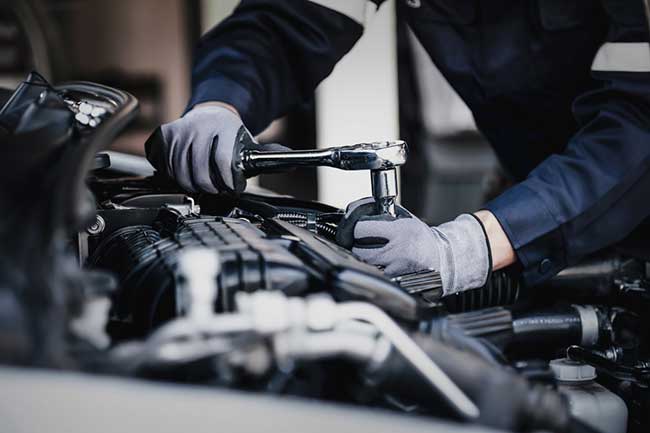All Categories
Featured
The timing belt is a vital part of your engine, in charge of synchronizing the movement of numerous engine parts, such as the crankshaft and camshaft. This guarantees the engine's shutoffs close and open at the correct times throughout the combustion cycle. While the timing belt may not be something you consider usually, overlooking its upkeep can bring about significant engine damage and pricey repair services. Right here's why timing belt substitute is vital for your car's longevity and efficiency.
What Is a Timing Belt and Exactly How Does It Work? The timing belt is a rubber or composite material belt that links the crankshaft to the camshaft in an internal combustion engine. The camshaft controls the opening and closing of the engine's consumption and exhaust shutoffs, and it needs to be timed perfectly with the activity of the pistons in the engine. The timing belt ensures that these parts remain in sync, enabling the engine to run efficiently.
If the timing belt stops working or ends up being broken, the camshaft and crankshaft will certainly no more be synchronized, which can cause the engine's shutoffs to strike the pistons. This leads to catastrophic engine damage and frequently requires pricey fixings or even an engine substitute.
Why Is Timing Belt Replacement Important? With time, the timing belt can use down as a result of rubbing, warmth, and basic engine wear. While it may look like a little issue, a faulty timing belt can result in severe engine issues. Right here's why timely replacement is essential:
Avoiding Engine Damages: As discussed, a broken or sliding timing belt can trigger the engine's shutoffs and pistons to collide. This causes curved shutoffs, harmed pistons, and in severe situations, a full engine failing. Replacing the timing belt before it damages can avoid this costly damage.
Keeping Engine Efficiency: A worn-out timing belt can disrupt the synchronization of the engine components, lowering total engine efficiency. Replacing the belt helps maintain optimal engine feature, ensuring smooth procedure, improved fuel effectiveness, and better efficiency.
Avoiding Unexpected Break down: A busted timing belt can leave you stranded on the side of the roadway, triggering a major hassle. By changing the timing belt at the suggested periods, you can avoid the risk of an unexpected failure, especially in the middle of a lengthy journey or when you least anticipate it.
![]()
Conserving Money in the future: While timing belt replacement can seem like an expense you could desire to avoid, it's much cheaper than the cost of fixing or changing a harmed engine. The substitute price is relatively budget friendly compared to the substantial repairs required if the timing belt breaks. Proactive maintenance can save you hundreds of dollars in repairs and preserve your vehicle's value.
When Should You Replace the Timing Belt? The timing belt substitute timetable can differ depending on your car's make and model. As a whole, most makers suggest changing the timing belt every 60,000 to 100,000 miles. It's constantly best to consult your proprietor's guidebook or a trusted technician for particular suggestions for your car.
Indications that your timing belt might need substitute include unusual engine sounds such as ticking or whining, problem beginning the engine, or an obvious decrease in engine efficiency. If you experience any one of these symptoms, it is essential to have the timing belt evaluated immediately.
![]()
Verdict. Replacing the timing belt at the advised periods is a vital component of keeping your engine's health and ensuring that your vehicle runs efficiently. A damaged timing belt can lead to pricey repair work, engine failure, and unforeseen failures, which can be prevented with proper upkeep.
What Is a Timing Belt and Exactly How Does It Work? The timing belt is a rubber or composite material belt that links the crankshaft to the camshaft in an internal combustion engine. The camshaft controls the opening and closing of the engine's consumption and exhaust shutoffs, and it needs to be timed perfectly with the activity of the pistons in the engine. The timing belt ensures that these parts remain in sync, enabling the engine to run efficiently.
If the timing belt stops working or ends up being broken, the camshaft and crankshaft will certainly no more be synchronized, which can cause the engine's shutoffs to strike the pistons. This leads to catastrophic engine damage and frequently requires pricey fixings or even an engine substitute.
Why Is Timing Belt Replacement Important? With time, the timing belt can use down as a result of rubbing, warmth, and basic engine wear. While it may look like a little issue, a faulty timing belt can result in severe engine issues. Right here's why timely replacement is essential:
Avoiding Engine Damages: As discussed, a broken or sliding timing belt can trigger the engine's shutoffs and pistons to collide. This causes curved shutoffs, harmed pistons, and in severe situations, a full engine failing. Replacing the timing belt before it damages can avoid this costly damage.
Keeping Engine Efficiency: A worn-out timing belt can disrupt the synchronization of the engine components, lowering total engine efficiency. Replacing the belt helps maintain optimal engine feature, ensuring smooth procedure, improved fuel effectiveness, and better efficiency.
Avoiding Unexpected Break down: A busted timing belt can leave you stranded on the side of the roadway, triggering a major hassle. By changing the timing belt at the suggested periods, you can avoid the risk of an unexpected failure, especially in the middle of a lengthy journey or when you least anticipate it.

Conserving Money in the future: While timing belt replacement can seem like an expense you could desire to avoid, it's much cheaper than the cost of fixing or changing a harmed engine. The substitute price is relatively budget friendly compared to the substantial repairs required if the timing belt breaks. Proactive maintenance can save you hundreds of dollars in repairs and preserve your vehicle's value.
When Should You Replace the Timing Belt? The timing belt substitute timetable can differ depending on your car's make and model. As a whole, most makers suggest changing the timing belt every 60,000 to 100,000 miles. It's constantly best to consult your proprietor's guidebook or a trusted technician for particular suggestions for your car.
Indications that your timing belt might need substitute include unusual engine sounds such as ticking or whining, problem beginning the engine, or an obvious decrease in engine efficiency. If you experience any one of these symptoms, it is essential to have the timing belt evaluated immediately.

Verdict. Replacing the timing belt at the advised periods is a vital component of keeping your engine's health and ensuring that your vehicle runs efficiently. A damaged timing belt can lead to pricey repair work, engine failure, and unforeseen failures, which can be prevented with proper upkeep.
Latest Posts
The Benefits of Routine Vehicle Maintenance at Montclare Auto Repair Saves You Money
Published May 26, 25
1 min read
Choosing the Right Roofing Color: Influence On Power Effectiveness
Published May 24, 25
1 min read
Boost Your Home's Outside with Weathercraft's House siding Solutions
Published May 24, 25
1 min read
More
Latest Posts
The Benefits of Routine Vehicle Maintenance at Montclare Auto Repair Saves You Money
Published May 26, 25
1 min read
Choosing the Right Roofing Color: Influence On Power Effectiveness
Published May 24, 25
1 min read
Boost Your Home's Outside with Weathercraft's House siding Solutions
Published May 24, 25
1 min read